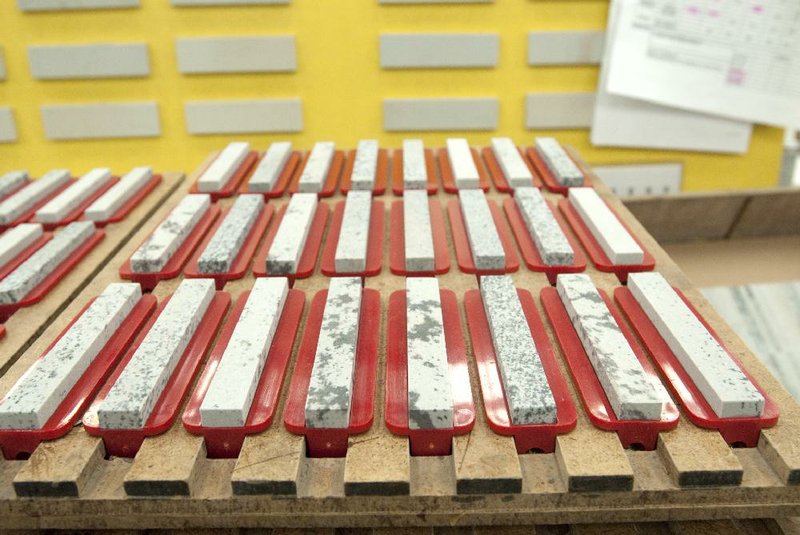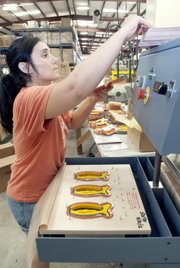LITTLE ROCK — Hundreds of years ago, in the mountains of Hot Springs, American Indians created sharp arrowheads and tools. In more recent times, companies have created whetstones and abrasives from the same material.
Novaculite, an exceptionally hard sedimentary stone with the properties of metamorphic rock, sharpens while it polishes and is the finest finishing stone in the world, experts say.
“It’s unique to this area. As far as I know, novaculite only exists in the outcrops here and immediately adjacent to this area,” said Steve Rudd, geologist and natural resources program manager for Hot Springs National Park. Novaculite quarries stretch across the Ouachita Mountain range from Arkansas to Oklahoma and in west Texas.
“I don’t know of another place where you could ever find it anywhere on the planet,” he added.
Novaculite is called the Arkansas stone. Its popularity spread worldwide and brought economic growth to the Hot Springs region as the companies in the industry grew.
But today, the popularity of the stone has waned because of a dwindling number of knife enthusiasts. Ceramic and diamond sharpeners, which are easier and less time-consuming to use, have become more common than the demanding Arkansas stone that requires time and effort to sharpen objects effectively.
There are only a few companies left that dabble in novaculite, and only two are left in Hot Springs: Smith’s Consumer Products and Dan’s Whetstone Co. There is also Saint-Gobain Abrasives, a subsidiary of a worldwide building materials company, that has an abrasives plant in Hot Springs but its headquarters are in Worcester, Mass.
The plant, at 303 Meadowlark Trail, employs seven people, spokesman Bill Seiberlich said. The Hot Springs operation has been mining the stone since 1832, but before 1989, the stone was sent to New Hampshire to be cut and produced, he said.
Smith’s Consumer Products employs about 30 people and is at 747 Mid-America Blvd. in Hot Springs.
“We are certainly a growing company,” said Chairman and Chief Executive Officer Dan Glidden, adding that the company’s sales in the last six years have doubled.
Smith’s, which specializes in knife sharpeners, has a strong presence in the sporting goods and hardware markets, as well as the home-ware market. Its products are sold by almost all major retailers, including Wal-Mart Stores Inc., Lowe’s Home Improvement and Bass Pro Shop. It recently launched a line of kitchen products, including graters and zesters, that is set to arrive in William-Sonoma stores by fall.
“We try to do unique, innovative things in any category we go into,” Glidden said, adding that the company is looking to expand into market areas that are “logical extensions of what we do.”
Smith’s has grown significantly since its formation in 1886, and the company is always looking to expand further, Glidden said. There is room for constructing additional working space outside the property, which Smith’s moved into just a few years back.
“We started off very small with the idea of, let’s manufacture the goods here in Arkansas; let’s produce them here in Arkansas and ship them all over the world,” said President Richard Smith, who is the fourth-generation owner of the company. “We expanded into a large operation. We still sell more natural Arkansas stones than anywhere in the world.”
But the company has changed since its early beginnings of a small, local company. It recently outsourced its mining to local competitor Dan’s Whetstone, in order to have a sleeker company model, Glidden said.
Dan’s Whetstone is a short distance southwest of Hot Springs, in Pearcy. The manufacturing facility, at 418 Hilltop Road, employs 31 people,said owner Dan Kirschman, who founded the company 36 years ago.
The company almost doubled in size last year, when it took over the mining for Smith’s, he said. It’s located in a remodeled poultry house and surrounded by boulders of novaculite in different colors and grades. Dan’s Whetstone cuts down and shapes the Arkansas stone in its facilities, as well as packages the products.
“We’re the biggest manufacturer now of Arkansas stone in the world,” Kirschman said.
While Smith’s still owns 600 to 700 acres of mineral rights and quarries, the company’s emphasis is on product design. Most of production takes place overseas in China, but Glidden and Smith said they are actively considering ways to bring manufacturing back to the United States. Right now, most of the company’s products are manufactured in China, with one exception: The Arkansas stone is added to the product in Hot Springs.
“The cost difference [of producing in China versus the U.S.] is getting less and less,” Glidden said. “There is still a cost difference, and consumers want the best value. But I think in a few years, it’s going to make sense to do more things in the U.S.”
But the most significant change in Smith’s business is the shrinking demand for Arkansas stone itself.
There used to be more than 20 companies in the area that competed for a share of the market, but now there are only a handful. And Arkansas stone sales make up less than 10 percent of Smith’s total sales, Glidden said.
“Back in the early years, everyone was focused on Arkansas stone,” Smith said. “But as things grew in the industry, and people came up with different ways and different things to use in the sharpening industry, they started to expand ... and people started using more than the Arkansas stone. The Arkansas stone takes a lot longer and a lot more time to use, but it gives you the best edge. But people these days want something fast, quick and easy.”
The companies in Hot Springs have been able to adapt to the changing nature of the industry. Smith’s produces ceramic and diamond sharpeners as an alternate to Arkansas stone. Dan’s Whetstone carries a line of sandstone coasters.
And the Arkansas stone’s use is not limited to knife sharpening. Other uses include sharpening medical instruments, testing gold and making watches.
Kirschman said one of his customers is an Austriansnow ski manufacturer, and the company had distributed Dan’s Whetstone materials to skiers at the Winter Olympics.
The industry was not affected by the recession, Smith said.
“Historically, any time there’s a downturn in the economy, our business starts to grow, as more people start to focus on staying closer to home - hunting, camping, fishing [activities that require knives] - and also taking care of their investments in knives, so they sharpen them and maintain them,” he said.
Although demand for the unique stone has stalled, Smith said he believes the Arkansas stone will remain an integral part of the sharpening industry. After all, it has been in his bloodline for generations. Smith worked in the quarries when he was only 10 years old.
“We’re always promoting Arkansas stone. This is our heritage,” he said.
Glidden said in the past, when retailers have dropped the Arkansas stone, customers always protest.
“It’s a minority of customers, but they’re vocal, and they still feel very strongly about the fact that you can get the best edge,” Glidden said. “I can’t imagine a time when Arkansas stone won’t be available for consumers.”
Business, Pages 66 on 07/01/2012

